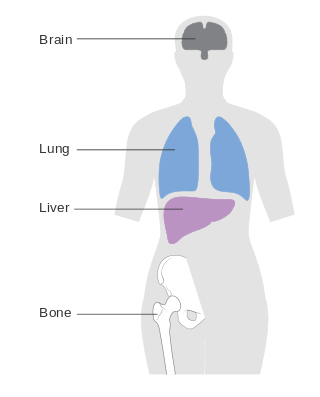
Metastasis is a pathogenic agent's spread from an initial or primary site to a different or secondary site within the host's body; the term is typically used when referring to metastasis by a cancerous tumor. The newly pathological sites, then, are metastases (mets). It is generally distinguished from cancer invasion, which is the direct extension and penetration by cancer cells into neighboring tissues.

Trastuzumab, sold under the brand name Herceptin among others, is a monoclonal antibody used to treat breast cancer and stomach cancer. It is specifically used for cancer that is HER2 receptor positive. It may be used by itself or together with other chemotherapy medication. Trastuzumab is given by slow injection into a vein and injection just under the skin.

Lapatinib (INN), used in the form of lapatinib ditosylate (USAN) is an orally active drug for breast cancer and other solid tumours. It is a dual tyrosine kinase inhibitor which interrupts the HER2/neu and epidermal growth factor receptor (EGFR) pathways. It is used in combination therapy for HER2-positive breast cancer. It is used for the treatment of patients with advanced or metastatic breast cancer whose tumors overexpress HER2 (ErbB2).

Pertuzumab, sold under the brand name Perjeta, is a monoclonal antibody used in combination with trastuzumab and docetaxel for the treatment of metastatic HER2-positive breast cancer; it also used in the same combination as a neoadjuvant in early HER2-positive breast cancer.
Triple-negative breast cancer (TNBC) is any breast cancer that either lacks or shows low levels of estrogen receptor (ER), progesterone receptor (PR) and human epidermal growth factor receptor 2 (HER2) overexpression and/or gene amplification. Triple-negative is sometimes used as a surrogate term for basal-like.

A circulating tumor cell (CTC) is a cell that has shed into the vasculature or lymphatics from a primary tumor and is carried around the body in the blood circulation. CTCs can extravasate and become seeds for the subsequent growth of additional tumors (metastases) in distant organs, a mechanism that is responsible for the vast majority of cancer-related deaths. The detection and analysis of CTCs can assist early patient prognoses and determine appropriate tailored treatments. Currently, there is one FDA-approved method for CTC detection, CellSearch, which is used to diagnose breast, colorectal and prostate cancer.

Afatinib, sold under the brand name Gilotrif among others, is a medication which is used to treat non-small cell lung carcinoma (NSCLC). It belongs to the tyrosine kinase inhibitor family of medications. It is taken by mouth.

Metastatic breast cancer, also referred to as metastases, advanced breast cancer, secondary tumors, secondaries or stage IV breast cancer, is a stage of breast cancer where the breast cancer cells have spread to distant sites beyond the axillary lymph nodes. There is no cure for metastatic breast cancer; there is no stage after IV.

A brain metastasis is a cancer that has metastasized (spread) to the brain from another location in the body and is therefore considered a secondary brain tumor. The metastasis typically shares a cancer cell type with the original site of the cancer. Metastasis is the most common cause of brain cancer, as primary tumors that originate in the brain are less common. The most common sites of primary cancer which metastasize to the brain are lung, breast, colon, kidney, and skin cancer. Brain metastases can occur months or even years after the original or primary cancer is treated. Brain metastases have a poor prognosis for cure, but modern treatments allow patients to live months and sometimes years after the diagnosis.

Trastuzumab emtansine, sold under the brand name Kadcyla, is an antibody-drug conjugate consisting of the humanized monoclonal antibody trastuzumab (Herceptin) covalently linked to the cytotoxic agent DM1. Trastuzumab alone stops growth of cancer cells by binding to the HER2 receptor, whereas trastuzumab emtansine undergoes receptor-mediated internalization into cells, is catabolized in lysosomes where DM1-containing catabolites are released and subsequently bind tubulin to cause mitotic arrest and cell death. Trastuzumab binding to HER2 prevents homodimerization or heterodimerization (HER2/HER3) of the receptor, ultimately inhibiting the activation of MAPK and PI3K/AKT cellular signalling pathways. Because the monoclonal antibody targets HER2, and HER2 is only over-expressed in cancer cells, the conjugate delivers the cytotoxic agent DM1 specifically to tumor cells. The conjugate is abbreviated T-DM1.
Eric P. Winer is a medical oncologist and clinical researcher specializing in breast cancer. He is director of Yale Cancer Center and president and physician-in-chief of Smilow Cancer Hospital Yale New Haven Health System, effective February 1, 2022. He also is Deputy Dean for Cancer Research at Yale School of Medicine. From 1997 to 2021, he was the Chief of the Breast Oncology Program at Dana–Farber Cancer Institute in Boston, Massachusetts. Beginning in 2013, he held a range of institutional roles at Dana-Farber, including Chief of Clinical Development, the Thompson Chair in Breast Cancer Research and Director of the Dana-Farber/Harvard SPORE in Breast Cancer. He also served as a Professor of Medicine at Harvard Medical School. He was president of the American Society of Clinical Oncology (ASCO) 2022-2023 and became Chair of the Board in mid-June 2023. His career has been focused on breast cancer treatment and research.

Abemaciclib, sold under the brand name Verzenio among others, is a medication for the treatment of advanced or metastatic breast cancers. It was developed by Eli Lilly and it acts as a CDK inhibitor selective for CDK4 and CDK6.

Elacestrant, sold under the brand name Orserdu, is an anticancer medication which is used in the treatment of breast cancer. It is taken by mouth.

Sandra M. Swain is an American oncologist, breast cancer specialist and clinical translational researcher. She is currently a professor of Medicine at the Georgetown University School of Medicine and the Associate Dean for Research Development at Georgetown University Medical Center (GUMC) and MedStar Health as well as an adjunct professor of Medicine at the F. Edward Hébert School of Medicine of the Uniformed Services University of Health Sciences. She is also a past President of the American Society of Clinical Oncology (ASCO), serving from 2012 through 2013.

Tucatinib, sold under the brand name Tukysa, is an anticancer medication used for the treatment of HER2-positive breast cancer. It is a small molecule inhibitor of HER2. It was developed by Array BioPharma and licensed to Cascadian Therapeutics.

Trastuzumab deruxtecan, sold under the brand name Enhertu, is an antibody-drug conjugate consisting of the humanized monoclonal antibody trastuzumab (Herceptin) covalently linked to the topoisomerase I inhibitor deruxtecan. It is licensed for the treatment of breast cancer or gastric or gastroesophageal adenocarcinoma. Trastuzumab binds to and blocks signaling through epidermal growth factor receptor 2 (HER2/neu) on cancers that rely on it for growth. Additionally, once bound to HER2 receptors, the antibody is internalized by the cell, carrying the bound deruxtecan along with it, where it interferes with the cell's ability to make DNA structural changes and replicate its DNA during cell division, leading to DNA damage when the cell attempts to replicate itself, destroying the cell.

Tatiana Michelle Prowell is an American medical oncologist specializing in breast cancer. She is an Associate Professor of Oncology at Johns Hopkins School of Medicine and Breast Cancer Scientific Liaison at the U.S. Food & Drug Administration.
Beth Ann Overmoyer is an American physician and oncologist. She is Director of the Inflammatory Breast Cancer Program at the Dana–Farber Cancer Institute.
Xavier Pivot is a French oncologist, university professor, breast cancer specialist and general director of the Strasbourg Cancer Institute. He is best known for his research on treatments with trastuzumab in HER2-positive breast cancers.

CNS metastasis is the spread and proliferation of cancer cells from their original tumour to form secondary tumours in portions of the central nervous system.















